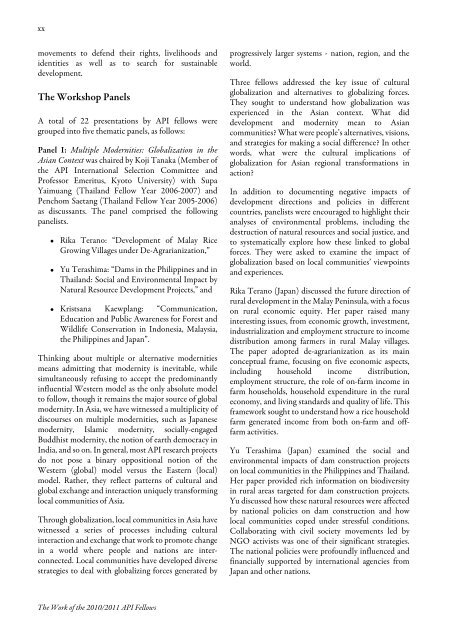Untitled - Api-fellowships.org
Untitled - Api-fellowships.org
Untitled - Api-fellowships.org
Create successful ePaper yourself
Turn your PDF publications into a flip-book with our unique Google optimized e-Paper software.
xxmovements to defend their rights, livelihoods andidentities as well as to search for sustainabledevelopment.The Workshop PanelsA total of 22 presentations by API fellows weregrouped into five thematic panels, as follows:Panel I: Multiple Modernities: Globalization in theAsian Context was chaired by Koji Tanaka (Member ofthe API International Selection Committee andProfessor Emeritus, Kyoto University) with SupaYaimuang (Thailand Fellow Year 2006-2007) andPenchom Saetang (Thailand Fellow Year 2005-2006)as discussants. The panel comprised the followingpanelists.• Rika Terano: “Development of Malay RiceGrowing Villages under De-Agrarianization,”• Yu Terashima: “Dams in the Philippines and inThailand: Social and Environmental Impact byNatural Resource Development Projects,” and• Kristsana Kaewplang: “Communication,Education and Public Awareness for Forest andWildlife Conservation in Indonesia, Malaysia,the Philippines and Japan”.Thinking about multiple or alternative modernitiesmeans admitting that modernity is inevitable, whilesimultaneously refusing to accept the predominantlyinfluential Western model as the only absolute modelto follow, though it remains the major source of globalmodernity. In Asia, we have witnessed a multiplicity ofdiscourses on multiple modernities, such as Japanesemodernity, Islamic modernity, socially-engagedBuddhist modernity, the notion of earth democracy inIndia, and so on. In general, most API research projectsdo not pose a binary oppositional notion of theWestern (global) model versus the Eastern (local)model. Rather, they reflect patterns of cultural andglobal exchange and interaction uniquely transforminglocal communities of Asia.Through globalization, local communities in Asia havewitnessed a series of processes including culturalinteraction and exchange that work to promote changein a world where people and nations are interconnected.Local communities have developed diversestrategies to deal with globalizing forces generated byprogressively larger systems - nation, region, and theworld.Three fellows addressed the key issue of culturalglobalization and alternatives to globalizing forces.They sought to understand how globalization wasexperienced in the Asian context. What diddevelopment and modernity mean to Asiancommunities? What were people’s alternatives, visions,and strategies for making a social difference? In otherwords, what were the cultural implications ofglobalization for Asian regional transformations inaction?In addition to documenting negative impacts ofdevelopment directions and policies in differentcountries, panelists were encouraged to highlight theiranalyses of environmental problems, including thedestruction of natural resources and social justice, andto systematically explore how these linked to globalforces. They were asked to examine the impact ofglobalization based on local communities’ viewpointsand experiences.Rika Terano (Japan) discussed the future direction ofrural development in the Malay Peninsula, with a focuson rural economic equity. Her paper raised manyinteresting issues, from economic growth, investment,industrialization and employment structure to incomedistribution among farmers in rural Malay villages.The paper adopted de-agrarianization as its mainconceptual frame, focusing on five economic aspects,including household income distribution,employment structure, the role of on-farm income infarm households, household expenditure in the ruraleconomy, and living standards and quality of life. Thisframework sought to understand how a rice householdfarm generated income from both on-farm and offfarmactivities.Yu Terashima (Japan) examined the social andenvironmental impacts of dam construction projectson local communities in the Philippines and Thailand.Her paper provided rich information on biodiversityin rural areas targeted for dam construction projects.Yu discussed how these natural resources were affectedby national policies on dam construction and howlocal communities coped under stressful conditions.Collaborating with civil society movements led byNGO activists was one of their significant strategies.The national policies were profoundly influenced andfinancially supported by international agencies fromJapan and other nations.The Work of the 2010/2011 API Fellows
















